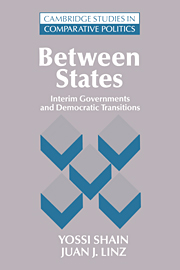Book contents
- Frontmatter
- Contents
- Preface
- Contributors
- PART ONE THEORY
- PART TWO CASE STUDIES
- 7 The provisional government and the transition from monarchy to Islamic republic in Iran
- 8 From revolution to democracy in Portugal: The roles and stages of the provisional governments
- 9 Accelerating collapse: The East German road from liberalization to power-sharing and its legacy
- 10 Interim government and democratic consolidation: Argentina in comparative perspective
- 11 The failure of an internationally sponsored interim government in Afghanistan
- 12 Electoral transitions in Yugoslavia
- 13 Democratization and the international system: The foreign policies of interim governments
- Index
13 - Democratization and the international system: The foreign policies of interim governments
Published online by Cambridge University Press: 05 August 2012
- Frontmatter
- Contents
- Preface
- Contributors
- PART ONE THEORY
- PART TWO CASE STUDIES
- 7 The provisional government and the transition from monarchy to Islamic republic in Iran
- 8 From revolution to democracy in Portugal: The roles and stages of the provisional governments
- 9 Accelerating collapse: The East German road from liberalization to power-sharing and its legacy
- 10 Interim government and democratic consolidation: Argentina in comparative perspective
- 11 The failure of an internationally sponsored interim government in Afghanistan
- 12 Electoral transitions in Yugoslavia
- 13 Democratization and the international system: The foreign policies of interim governments
- Index
Summary
As to whether it is just or unjust to fulfill or not to fulfill [agreements] when the city undergoes revolution into another regime, that is another argument.
Aristotle, The Politics, Book 3, chapter 3INTRODUCTION
While the other essays in this volume focus on the domestic challenges that interim regimes face, all twentieth-century democratic transitions are also inescapably international phenomena. The collapse of any dictatorship elicits a reaction from foreign powers – one whose content has converged over time – to which interim governments must somehow respond. As global consensus on the desirability of liberal democracy has grown, the role of this pressure from without has only become an all the more critical force in any transition dynamic. The aim of this chapter is to advance our understanding of both the international impact of democratic transitions and the role of international factors in enhancing or undermining the prospects for democratic consolidation.
Considerable scholarly attention has been focused on the domestic policies that can impede or advance democratization, but comparatively little work has been done to date on either the foreign policies that can contribute to or detract from the task of building democracy or the interaction between the domestic and international agendas of fledgling democracies.
In many ways, the relative neglect of the foreign policies of postauthoritarian regimes is understandable. After all, in the immediate aftermath of revolutionary upheaval, the task of reestablishing domestic order would seem to overwhelm any concerns about building new international identities.
- Type
- Chapter
- Information
- Between StatesInterim Governments in Democratic Transitions, pp. 255 - 304Publisher: Cambridge University PressPrint publication year: 1995
- 3
- Cited by

